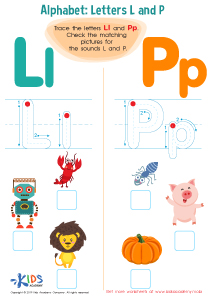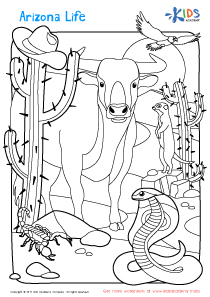Science Lessons | Organisms for Ages 4-5
9 results
Dive into the fascinating world of living things with our "Organisms for Ages 4-5" lessons! Tailored specifically for curious young minds, this series offers a vibrant mix of interactive worksheets, captivating educational videos, and engaging assessment quizzes to spark a lifelong interest in the natural world. Watch your child marvel at the diversity of life, from the tiniest insects to the largest mammals, all while developing critical thinking and observation skills. Our age-appropriate content ensures that learning about organisms is not only educational but also incredibly fun. Join us on this adventure of discovery and help your child grow their understanding of the world around them!
Introducing young children to the wonders of the natural world is a journey filled with discovery, excitement, and invaluable learning opportunities. Our innovative lessons on Organisms for Ages 4-5 are meticulously designed to cater to the curious minds of preschoolers, offering them a foundational understanding of the diversity of life on our planet. These lessons, which include a mix of interactive worksheets, educational videos, and assessment quizzes, are not just engaging but are also instrumental in helping kids develop a range of skills and knowledge essential for their academic growth.
At the heart of our Organisms for Ages 4-5 lessons is the desire to nurture a sense of wonder and appreciation for nature in young learners. By introducing them to the concept of organisms in an age-appropriate manner, we lay the groundwork for lifelong learning and curiosity about biology, ecology, and environmental science. Our interactive worksheets are designed to captivate children's attention while promoting hands-on learning. These activities encourage children to observe, identify, and classify different types of organisms, from the smallest insects to the tallest trees, fostering an early scientific mindset.
Moreover, our educational videos serve as a powerful tool to bring the study of organisms to life. Through engaging visuals and storytelling, children are transported into various habitats, where they can see and hear the organisms they are learning about. This multimedia approach caters to various learning styles, ensuring that every child finds a way to connect with the material. The videos also introduce young learners to basic biological concepts and vocabulary in a fun and accessible way, laying a strong foundation for future scientific exploration.
Assessment quizzes, though designed to be age-appropriate and non-intimidating, play a crucial role in reinforcing the knowledge acquired through worksheets and videos. These quizzes provide a gentle way for children to demonstrate their understanding of the lessons, offering immediate feedback that both encourages and motivates them. This formative assessment approach ensures that learning about organisms remains a positive and confidence-building experience for young children.
Beyond academic growth, our lessons on Organisms for Ages 4-5 also contribute to the development of critical life skills. For instance, observing and learning about the diversity of life helps nurture empathy and respect for living things, encouraging responsible behavior towards the environment from a young age. Additionally, the interactive nature of the lessons promotes problem-solving skills, attention to detail, and the ability to follow directions – skills that are invaluable in any area of study.
In conclusion, our targeted lessons on Organisms for Ages 4-5 are much more than just an introduction to biology. They are a holistic educational experience designed to foster a love for learning, enhance cognitive and social skills, and instill a sense of responsibility towards our planet. By engaging with these lessons, children are not only preparing for their future studies but are also embarking on a lifelong journey of discovery and appreciation for the natural world around them.

















